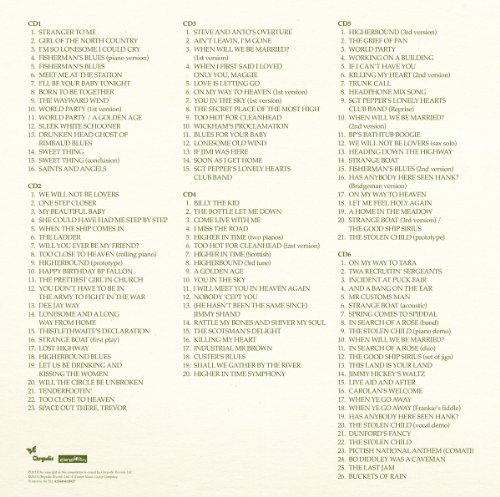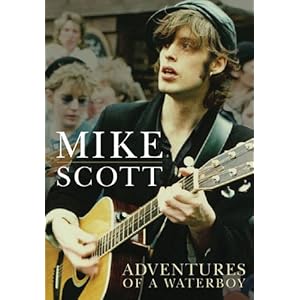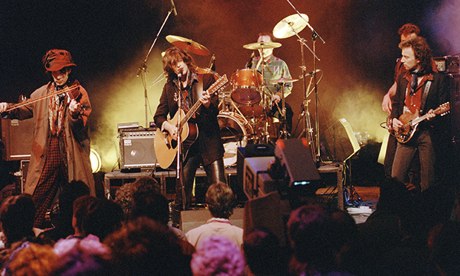At some point I realised that extended 2-CD edition of Fisherman's Blues had joined the list of My All-Time Favourite Albums. It crept there unnoticed until I read the announcement about the imminent release of Fisherman's Box, being the complete FB sessions 1986-88 and realised I had to have it. So I got it and it proved a mixed blessing.
Admittedly I've only played it once but then it is over 7 hours of music which is a lot to get through. While there is a lot of good stuff, the overall feeling I came away with was that Scott got it right on the 2-CD edition. The accompanying booklet is interesting, particularly for Scott's track by track comments and, as you can see above, there's a lot of them. For all intents and purposes The Waterboys are Mike Scott and a varying bunch of musicians some who stay with him for years, other for about five minutes. Which is why I was tempted by his autobiography.
I'm not in the habit of buying books about, but especially by, musicians (though there are always exceptions) because they usually aren't very well written and most so-called autobiographies are ghost-written. Scott, however, is an exception because he happens to be very literate and an good writer. He's also, I believe, quite honest about himself (mostly).
Here's another example of why Scott is one of the most interesting of contemporary musicians. The last Waterboys album An Appointment With Mr Yeats came out in 2011 and is a collection of songs with lyrics taken from poems by William Butler Yeats the famous Irish poet and playwright. To do something like this and do it artistically successfully is not easy. At the very least the singer has to sing with absolute clarity so that every word is heard by the listener, and not only that but it has to convey the rhythm of the poem as created by its author. The music then has to mirror the poem's tone and tempo. Lastly it has to appear seamlessly as an organic unit as if it was always a whole piece, not just a poem set to music.
Amazingly, Scott has done just this. I won't pretend it's an immediately accessible album, it isn't. Like, say Joni Mitchell's masterpiece Hejira, it takes several listenings to reveal its secrets. But it's worth it. The first track The Hosting of the Shee opens softly but rapidly changes into a barrage of multi-instrumental sound as Scott almost yells out the Wild Ride of faery warriors. The lovely and all too brief Sweet Dancer, with singer Katie Kim, could almost be a modern song. That said, Scott has not always lifted the poems intact. Although all the words are by Yeats, sometimes they can be pieced together from up to three sources, often to add a chorus. When you read his autobiography, which ends a decade before this was recorded, you realise that this is something he's been building up to for years.
Scott is, of course, a Scot who was given an acoustic guitar and a Rolling Stones album for his tenth birthday by his father who didn't see him again for over thirty years. From a young age, Scott has been making music in his head and this book really is all about him trying to get it out of there and into the world. He became a punk, started a fanzine and wrote a letter to Patti Smith asking for an interview. Smith invited him to London, paid for his hotel room (in her hotel), gave him the interview, and, either in person or with another band member, looked after him there and at the theatre, an act of completely unexpected kindess from her to a 19 year old kid.
Time passed, Scott formed the Waterboys and what happened next takes up the bulk of the book from thunderous rock to rootsy Celtic folk style and out again. He's generally honest about himself, telling stories which don't show him in too good a light, and also about other people. He's also the first to give praise to the musicians and other people he's met and worked with where it's due and criticism where it isn't.
Perhaps he may be a little coy about his relationships with various girlfriends but then this isn't a kiss and tell story. He does go into detail about his traumatic relationship with a needy decade-older alpha New York woman, but is more tactful about his first wife. The story of how he met his second wife is rather sweet and it happened when he retreated to the humanist mystical community of Findhorn which he portrays as a fascinating and open place. To me, Findhorn sounds like a place for those, too intelligent to be suckered in by traditional religions, but who seek varying paths to uncovered some form of transcendent truth though I have to say that what Scott discovers is rather appealing even while the cynical side of me thinks it's mystical bullshit for intellectuals. Be nice if they were right though. Anyway, he finds himself attracted to a young dance teacher and after some deep thinking decides she is the love of his life and invites her out. She accepts but doesn't realise it was for a date, confesses she hadn't really thought of him in that way. A little while later, she asks to go out with him again and confesses that she'd been doing some deep thinking and has decided that she does like him in that way and over twenty years later it looks as if the deep thinking was right.
Scott is a good writer, he's an interesting person, and I really enjoyed reading this book. My only grumble is that it stops around the time of the millennium thereby omitting the next ten years of his life.







No comments:
Post a Comment